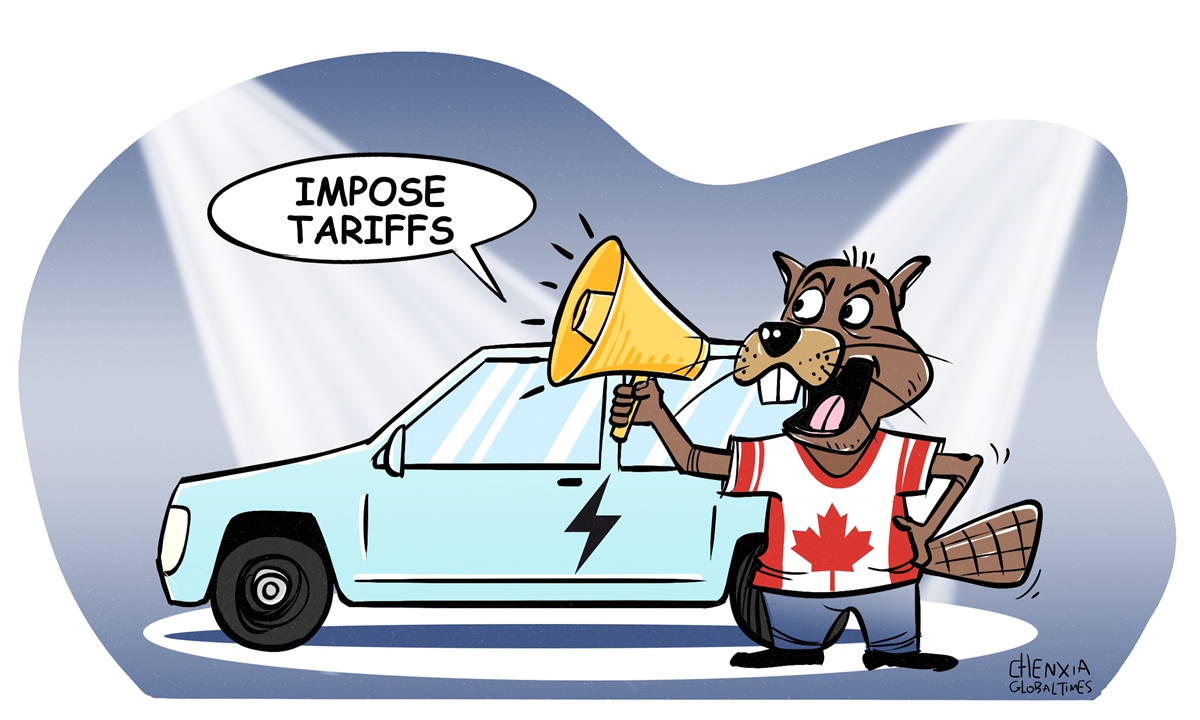
Illustration: Chen Xia/GT
Citing people familiar with the matter,
mk Bloomberg has reported that Canada is preparing potential new tariffs on Chinese-made electric vehicles (EVs) to align itself with actions taken by the US. We advise Canada to remain strategically rational. There is no need for Ottawa to sacrifice normal economic exchanges with China for the sake of Washington's strategic selfishness.
Even if Canada decides to ramp up tariffs on Chinese-made EVs, it is expected to have only a limited impact on China's EV industry. The EV market in Canada is not yet as mature as in some other Western countries. Although EV sales in the country have risen in recent years, EV adoption rates are low, partly because of Canada's bitter winters. As temperatures start to drop in winter, so does the range of an EV. Some EVs can lose up to 30 percent of their range in freezing temperatures, according to reports.
The value of EV imports from China stood at C$2.2 billion ($1.6 billion) in 2023, and a large portion was made up of Tesla cars produced at the US tech giant's Shanghai factory, according to media reports. Chinese brands are not a major player in Canada's undeveloped EV market. Therefore, even if Canada hikes tariffs on EVs from China, it will have little impact on Chinese brands. Obviously, the political symbolism exceeds the practical efficiency.
The US is Canada's most important trading partner. Canada's long and complex relationship with the US has had a significant impact on its economy. This is normal and understandable. Although the US plan to impose hefty tariffs on Chinese EVs has raised concerns among business communities, with many calling it anti-climate and anti-competitive behavior, the US is likely to continue to pressure Canada to join its crackdown on China's EV sector.
Canada seems to be facing increasing political pressure to align itself with actions taken by the US, but what Canada really needs is an independent foreign policy. If Canada is led by the nose by the Americans to confront China, it won't be good news for the Canadian economy.
China is Canada's second-largest trading partner and the economies are interconnected. It should be noted that any political disruption to such important economic ties will be regrettable and represent a loss for the Canadian economy.
Canada is experiencing anemic economic growth. The economy expanded at an annualized rate of 1.7 percent in the first quarter, missing analysts' forecasts. In considering Canada's own interests, Canadian politicians should maintain strategic sobriety and give top priority to developing its own economy, instead of succumbing to US pressure.
Ottawa's reported intention to replicate the US decision to impose new tariffs on EVs imported from China may undermine market confidence among Chinese investors, worsen bilateral relations and hinder normal economic and trade cooperation.
Commenting on US tariffs imposed on several Chinese products, including a major hike in levies on Chinese EVs, Wang Wenbin, then spokesperson for the Chinese Foreign Ministry, said in May that China has always opposed violating WTO rules and unilaterally imposing tariffs. "China will take all necessary measures to safeguard its legitimate rights and interests," Wang said.
If Canada is indeed considering following in the footsteps of the US to impose new tariffs on EVs from China as reported, then Wang's words can serve as a wake-up call for Ottawa.
Economic complementarity and comprehensive trade and economic cooperation should drive the advancement of China-Canada economic relations. We hope that Ottawa can respect the endogenous driving force of China-Canada economic cooperation instead of using political issues to interfere in normal economic exchanges between the two countries.
The author is a reporter with the Global Times. bizopinion@globaltimes.com.cn

